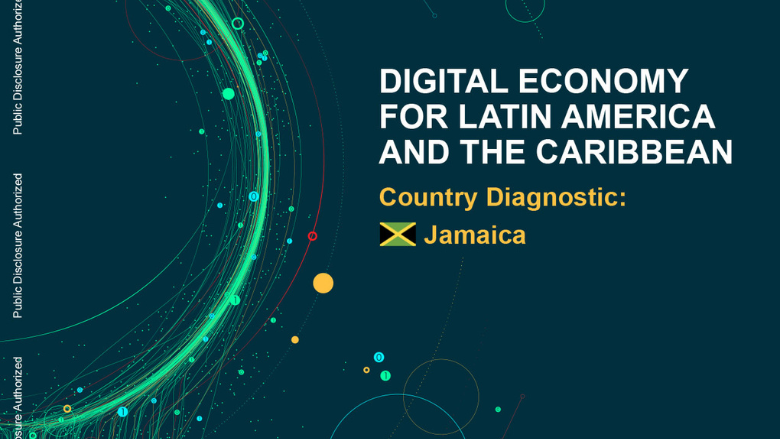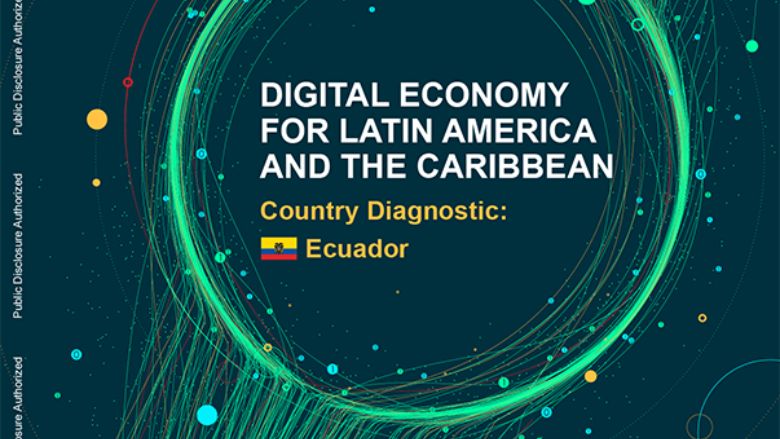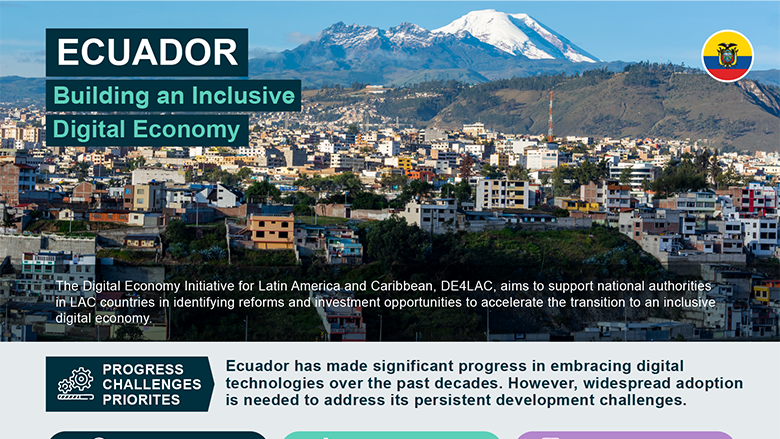Digital technologies are reshaping virtually every aspect of daily life. The impacts of digital transformation are diverse and dynamic, from productivity gains across economic sectors, to improvements in the efficiency and quality of service delivery, to the creation of new sources of value.
Countries in Latin America and the Caribbean (LAC) have tremendous opportunities across multiple foundational pillars for a robust digital economy. The backbone of the digital economy is access to a meaningful (safe, productive and affordable) internet connection and data. A recent study showing that 75 percent of the richest quintile of the population in LAC uses internet while only 37 percent of the poorest quintile does suggest stark differences in access to digital technologies across income groups. 35 percent of adults in LAC report not using digital payments, relying instead on cash-based transactions. Indigenous populations and Afro-descendants face higher rates of digital exclusion in many countries.
The COVID-19 crisis has highlighted the risks in LAC’s as-yet slow transition to digital economy. In countries with limited and uneven adoption of digital technologies, governments were constrained in their ability to provide emergency assistance to households, firms struggled to sustain their revenue streams, and children without access to e-learning services experienced more pronounced learning losses. Embracing digital transformation deliberately and strategically can allow LAC countries to overcome the socioeconomic impacts of the COVID-19 pandemic and explore innovative avenues toward green, resilient, and inclusive development (GRID) [PDF].
Transforming economy, boosting prosperity
Technology adoption by firms, alongside complementary investments in digital skills, organizational and other types of intangible capital, can improve competitiveness and lead to productivity growth. Entrepreneurship in digitally intensive sectors can help foster innovation, create new markets, and help spread the benefits of the digital economy to other sectors. Likewise, digital financial services can promote more efficient and convenient payments—a cornerstone for the development of e-commerce and digitally enabled platform business models.
Widespread adoption of digital technologies can foster inclusion and lower vulnerability through multiple channels: enhanced connectivity and access to digital services have been shown to have positive impacts on reducing income inequality at the household level. Digital financial services can help businesses overcome eligibility and affordability constraints and provide individuals safe and reliable ways to make payments, save, access credit, and insure against risk. Digital technologies can also be leveraged to improve the coverage of social protection programs and minimize inefficiencies in the disbursement of financial support.
A well-functioning digital economy can help create more and better jobs in the region. Digital platforms like freelance marketplaces, ride-hailing, or food delivery apps can reduce transaction costs and facilitate the matching of job seekers and employment opportunities. What’s more, recent studies show that—if adequately regulated— digital platforms can promote formalization and reduce gender gaps in emerging economies. Digital transformation presents a unique opportunity to countries that face the dual challenge of accelerating productivity growth while mitigating and adapting to climate change.
Challenges of digital transformation
Uneven access to and adoption of digital technologies can exacerbate rather than mitigate high levels of inequality and social exclusion in LAC, widening the gap between the new participants of the digital economy and those left behind. Adoption of digital technologies also introduces new risks, such as those associated with personal data protection, cybersecurity and cybercrime. In turn, digital infrastructure expansion could lead to an increase of energy consumption. For instance, data centers are set to soon have a bigger carbon footprint than the entire aviation industry. Broadband enabled devices contribute to waste of electrical and electronic equipment (e-waste), which is one the fastest growing waste streams in developed countries. The expansion of Big Tech into developing countries with weak competition frameworks and institutions may subject national markets to anti-competitive practices. Last but not the least, the increased amount of data and the related economic benefits and risks may prompt governments to lean towards data localization regimes, which are likely to affect data flows and the overall system efficiency.
The way forward
Responding to the opportunities and challenges facing digital transformation requires a holistic approach, underpinned by forward-looking reforms by governments and innovative investments by both the private and public sectors. Likewise, countries need to design, develop, and implement adequate governance, legal and regulatory frameworks, which on one side enable the potential of the digital revolution; while on the other create appropriate safeguards to limit its associated risks.
DE4LAC is supported by the Digital Development Partnership (DDP), administered by the World Bank Group. DDP offers a platform for digital innovation and development financing, bringing public and private sector partners together to advance digital solutions and drive digital transformation in developing countries. Find out more: www.digitaldevelopmentpartnership.org



